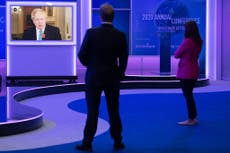It took a hedge fund to highlight tragedy behind apparently dry inflation figures
Retailers have been desperately discounting to tempt shoppers as the pandemic takes the shirts from their backs, writes James Moore


CPI (inflation) data can often appear abstract but this data reveals the very real, and in many cases tragic, events playing out on the high street.”
We tend to view hedge funds as aloof, callous and disconnected from the rest of a society they look down on from their glittering eyries.
Yet of all the comments I saw opining on the latest inflation data – it showed a sharp fall from 0.7 per cent to 0.3 per cent that rather caught the City on the hop – it was that one from a hedge fund that got to the heart of the matter.
“The downward pull of clothing and footwear in particular reflects how so many retailers have lost the shirt off their backs and are walking barefoot after nine months of the pandemic,” Ayush Ansal, chief investment officer at Crimson Black Capital, also said, continuing in the same vein.
And he was right. What the figures show is that retailers, reeling from a second lockdown, responded with a desperate bout of discounting in a bid to tempt shoppers to part with their money. The havoc wrought by the pandemic put the priority on making a sale, any sale.
How many will be able to hold out without their shirts over the coming months remains to be seen. Closing down sales will certainly reduce any future upward pressure on prices. Unions have been calling for government help. Those calls are only going to get louder.
A little stability would certainly be a boost, and the virus isn’t good for that. But the diseased minds of a Brexiteer cabinet don’t help.
A Brexit deal would minimise the instability. It may not come.
If it does, there will still be some disruption but prices should at least continue to remain flat for several months, that is if they don’t fall.
It’s worth pointing out that it wasn’t just the discounting of clothes, footwear and other consumer goods that dragged the official CPI inflation number down and chopped the other measures as well.
Perhaps surprisingly given lockdown, food prices also declined. The official figures thus contradicted those from researcher Kantar, whose survey of the nation’s shopping baskets via its 40,000 strong panel had them rising, although it did say the rate of increase had fallen since the summer.
A no-deal outcome – still a very real threat despite the more optimistic noises coming out of the talks in recent days – would inevitably change the calculus. The government appears to believe that £3bn in annual tariffs on food imports won’t affect prices. Almost no one else does.
Panic buying in the run up should be enough to get an inflationary spike started. You don’t need to do that, said business secretary Alok Sharma, airily brushing aside the threat of no-deal shortages. The British Retail Consortium also said please don’t do it.
The problem is that covering themselves is a rational choice for shoppers to make. The possibility of food price inflation of up to 5 per cent, predicted by Tesco chair John Allan, only adds to that. Why not stock up on reasonably priced provisions while you can? If you can.
As Ansal stated, there’s a lot going on behind these ostensibly abstract figures. There’s a lot of human drama and it’s going to be months before the curtain is brought down on it.
That makes life tough for the Bank of England’s policymakers who could be forgiven for popping valium before their meetings.
They have a policy announcement coming. They’re not expected to print more money, sorry, they’re not expected to signal another bout of “quantitative easing”, which is the Threadneedle Street’s preferred term for buying government bonds and other financial assets with the aim of pumping more money into the economy. So it amounts to much the same thing.
Such a move is easier to contemplate with the inflation genie stuck in its bottle.
A no-deal Brexit could pull out the stopper and create the mother of new year hangovers for the bank along with everyone else.
Join our commenting forum
Join thought-provoking conversations, follow other Independent readers and see their replies
Comments


Bookmark popover
Removed from bookmarks